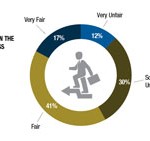
What’s Bugging You?
Some of the issues I hear about from readers are true hot button topics that are on the minds of everyone in the community. Others are rather more idiosyncratic and personal. But they are, to me at least, uniformly engaging. Here are a few of the more interesting comments I’ve received in the past few months.
The Right to Repair
Nothing seems to rile biomeds more than being told they aren’t allowed to fix something. That is, after all, their reason for existence. So when manufacturers put roadblocks in the way of repairing their equipment, expect a bit of friction. As one reader recently told me, “I am a big proponent of the right to repair for our industry. Yet much of HTM leadership seems to treat this as a hot-potato or third-rail kind of issue. ACCE and AAMI should be all aboard with this and make it a marquee issue, as it speaks to the survival of our industry as we know it. “
Another reader wrote that he is particularly irked by OEMs who make a policy of “forbidding the posting of user and service manuals.” Referring to the well-known website, Frank’s Hospital Workshop, he noted that “a browsing of various categories of equipment service manuals shows some manufacturers who have requested that their manuals be removed.” He suggests that one way around this policy that doesn’t violate copyrights is for biomeds to post their own PM procedures on the site. As he says, “The experience of the biomed is often a welcome addition to the manufacturer’s procedures.” On the other hand, he notes, “this takes a writing effort that’s not for everyone.”
Salaries

It turns out he wasn’t—but just barely.
Another reader asked a question that I’ve heard several times since we published our data. In our most recent report, we reduced the number of regions for which we reported average salaries from nine geographic areas to four. He rightly pointed out that this can skew the averages for certain areas with lower costs of living, such as the mountain states that are now included with the West Coast states.
As I told him, though, the response to our survey from less populous regions is so low that the averages are not statistically reliable. So we’re damned if we do, and damned if we don’t.
We’ll make every effort to increase our response from those areas in our next survey. And as I told my correspondent, if you have any ideas on how to do so, please let me know.
The Alphabet Soup Syndrome
It’s appropriate in an issue for which the cover story is about certification to note one reader’s recent lament about the abundance of initialisms in our community and this magazine. Mike Lane, Esq, CBET BAMF, of Las Vegas, NV, seems to think this is some kind of problem:
Is it a man thing (longer is better)? Are there rules to what you can put behind your name? In your magazine alone I found these credentials listed : MSETM / AAMI COO / MS / CCE / FACCE / FASHE / FHIMSS / MSBE / CBET / CRES / CLRS / PE / PHD and my favorite (thanks Pat) HIT Pro/PW.
If you are proud of your long string of initials, don’t take it personally. As Mike adds, “It’s all in jest and these people need to be recognized for their educational efforts. So keep up the good work and may the most credentialed person win!”
A Secret Trekkie

Have you got a thought you want to share with me and your fellow readers? Let me know: Submit your comments below.






With the new CMS/JC effort to have the Inspection and PM process follow manfacturer’s manuals, how can we do this if we are not even able to get manuals from the manufactures? This is why the Digital Right To Repair issue is so important. The regulatory compliance of our organization could be in question since we are not able to follow the manufacturer’s procedure. See JC EC.02.04.03 EP24. just released and effective on 07/01/2014.
Thanks, Matt. For those wanting more details on the Joint Commission’s changes to its PM requirements, see 24×7‘s summary from last week.
I know that my comments will raise some ire. I am retired from medical sales and service. I was part owner in a company that was a dealer for several product lines and also provided service on the medical devices that we sold . Over the 40+ years that we were in business, I could never understand why hospitals would allow ISO’s to service equipment that they had not been trained to work on, then call my company on our 800 number and expect us to train them over the phone. After a few minutes of conversation, it was quite evident that they did not have a clue, yet from a legal standpoint, we were on the wire. How did we know that they were actually doing what they were told to do and in a safe manner, but we had helped them.
We had the same problem with in-house biomeds. You can’t become a specialist in five minutes, and how can you expect the company you are calling to bear the cost of training you over the phone? Hospitals want to cite that you owe it to us because we bought the product but the reality is, how can we be expected to train technicians for the life of the product, which may be 10-15 years. Likewise I have seen many times that “off label” parts have been installed by third parties and hospitals on products that effectively negate the 510k and/or the electrical listing of the product. If you are going to provide service on medical devices, why is a log book similar to aircraft not required to be kept to document who did the work and/or parts substitution? I have also seen scores of instances that OEM-recommended maintenance procedures were not followed, yet there was a “PM” sticker on the equipment.
Chuck, I can somewhat agree with you, I ran into the same problem when I was a Master Tech at a Ford Dealership. I spent many hours nights and weekends getting my credentials, and then get told by outside shops we owe them free information. In the medical equipment side most companies will offer a couple slots for service maintenance schooling. Some of these slots are expensive, and the hospital has to pay our travel and meals. However the Hospitals don’t want to send the techs, they dont see the value of this education on their new equipment. Technology changes, when I finished biomed school, technology was at one level, in 2 years its doubled. Also when we get the manuals, most know it all techs are too lazy to read them before attempting a repair. It’s kind of a double edge sword.